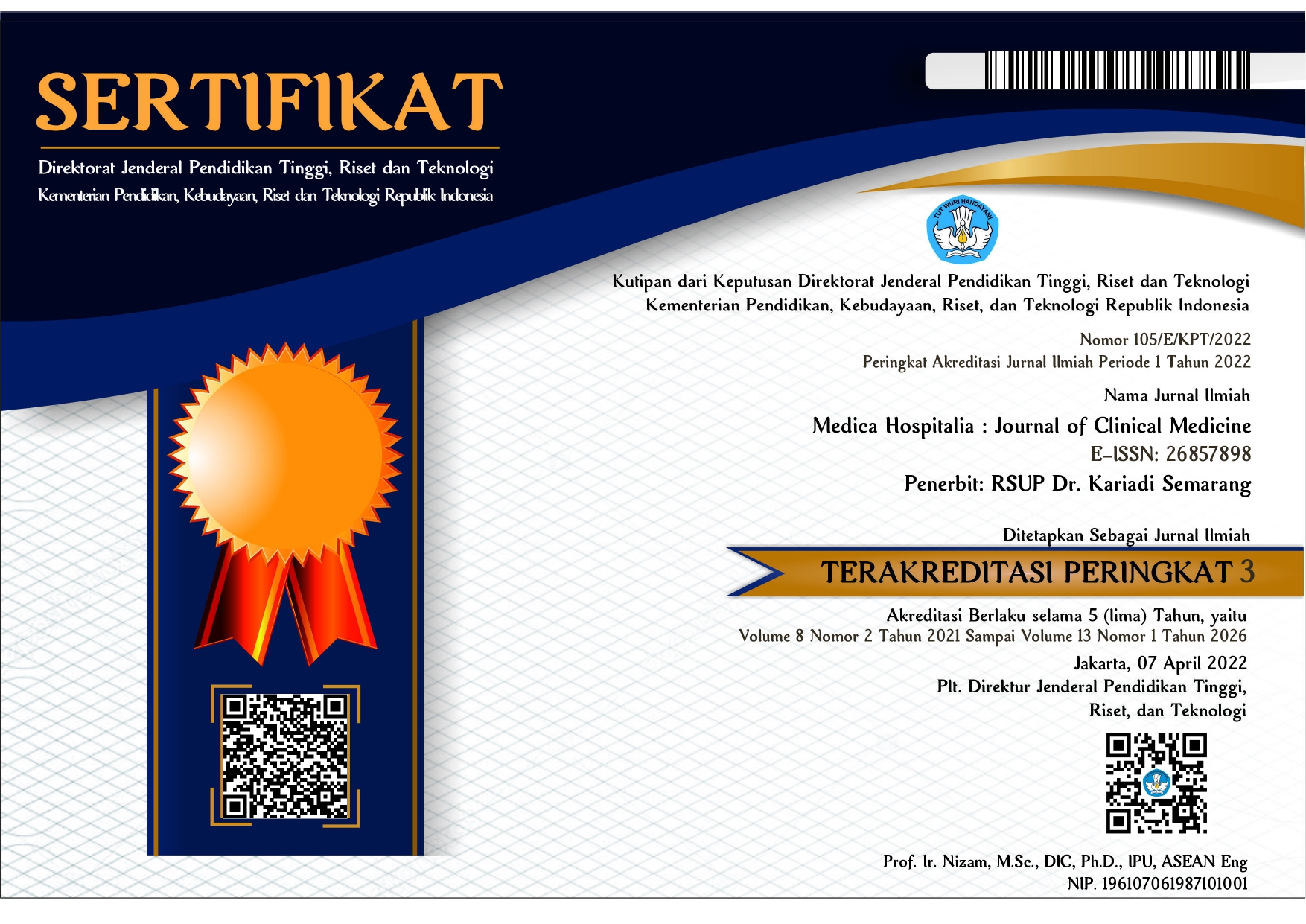Hubungan Kadar Kreatinin Serum Dengan Kadar Mineral Pada Pasien Chronic Kidney Disease
DOI:
https://doi.org/10.36408/mhjcm.v7i2.510Keywords:
Kreatinin, mineral, magnesium Chronic Kidney Disease, hemodialisisAbstract
Pendahuluan : Chronic Kidney Disease (CKD) merupakan gangguan fungsi ginjal yang irreversible, yaitu kemampuan tubuh gagal untuk mempertahankan metabolisme dan keseimbangan cairan dan elektrolit dan juga mineral. Sebagian besar proses metabolisme memerlukan dan dipengaruhi oleh elektrolit. Konsentrasi elektrolit mineral yang tidak normal dapat menyebabkan banyak gangguan . Saat fungsi ginjal semakin memburuk menjadi Stadium CKD 4 dan 5, ekskresinya cenderung berkurang dan tidak dapat dikompensasi. Tujuan penelitian ini adalah melihat pengaruh CKD pada mineral yaitu magnesium dan calcium.
Metode : Penelitian ini adalah penelitian observasional retrospektif dengan pendekatan belah lintang (cross sectional) dengan melihat rekam medik pada senter tunggal di RSUP Dr. Kariadi Semarang selama periode 1 Januari 2017 – 31 Desember 2018 untuk kemudian dilihat hubungan pengaruh kadar kreatinin serum dengan magnesium dan calcium pada pasien CKD dengan terapi hemodialisis.
Hasil dan pembahasan: Terdapat hubungan signifikan positif lemah antara kreatinin serum dengan magnesium (p=0,032, r= 0,327). Tidak terdapat hubungan antara kreatinin serum dengan kadar kalsium.
Simpulan : Dari hasil penelitian dapat disimpulkan bahwa secara statistik terdapat hubungan yang bermakna antara kadar kreatinin serum dengan magnesium pada pasien Chronic Kidney Disease (CKD) dengan terapi hemodialisis.
Kata Kunci
Kreatinin, mineral, magnesium Chronic Kidney Disease, hemodialisis.
ABSTRACT
Introduction: Chronic Kidney Disease (CKD) is an irreversible kidney function disorder, which is the body's ability to fail to maintain metabolism and balance fluid and electrolytes and minerals. Most metabolic processes require and are influenced by electrolytes. Abnormal mineral electrolyte concentrations can cause many disturbances. When kidney function getting worse to stages CKD 4 and 5, the excretion tends to decrease and cannot be compensated. The purpose of this study is to look at the effect of CKD on minerals namely magnesium and calcium.
Method: This study was a retrospective observational study with a cross sectional approach by looking at medical records at RSUP Dr. Kariadi Semarang during the period of 1 January 2017 - 31 December 2018 to see the correlation of influence of serum creatinine levels with magnesium and calcium in CKD patients with hemodialysis therapy.
Results and discussion: There was a significantly weak positive correlation between serum creatinine and magnesium (p = 0.032, r = 0.327). There is no correlation between serum creatinine and calcium levels.
Conclusion: The results of the study it can be concluded that there is a statistically significant correlation between serum creatinine levels with magnesium in Chronic Kidney Disease (CKD) patients with hemodialysis therapy.
Keywords
Creatinine, minerals, magnesium Chronic Kidney Disease, hemodialysis.
Downloads
References
2. Susalit E. Diagnosis dini penyakit ginjal kronik. Jakarta: RSUPN. Dr. Cipto Mangunkusumo. 2009.
3. Leslley A, et al. KDOQI US Commentary on the KDIGO Clinical Practice Guideline for the evaluation and management of CKD. Am J Kidney Dis. 2012; 63(5):713-35.
4. Sacher R.A. dan Mcpherson R.A, ‘Pengaturan Asam-Basa dan Elektrolit’ pada: Tinjauan Klinis Hasil Pemeriksaan Laboratorium, edisi kedua, Penerbit Buku Kedokteran EGC, Jakarta, 2002, hh.320-340.
5. Matfin G. and Porth C.M, ‘Disorders of Fluid and Electrolyte Balance’ In: Pathophysiology Concepts of Altered Health States, 8th Edition, McGraw Hill Companies USA, 2009,pp. 761-803.
6. Scott M.G., LeGrys, V.A. and Klutts J, ‘Electrochemistry and Chemical Sensors and Electrolytes and Blood Gases’’ In: Tietz Text Book of Clinical Chemistry and Molecular Diagnostics, 4th Ed. Vol.1, Elsevier Saunders Inc., Philadelphia, 2006, pp. 93-1014.
7. Frenkel WN, et al: The association between serum sodium levels at time of admission and mortality and morbidity in acutely admitted elderly patients: a prospective cohort study. J Am Geriatr Soc 2010; 58: 2227–2228.
8. de Baaij JHF, Joost GJ et al. Regulation of magnesium balance: lessons learned from human genetic disease. Clin Kidney J 2012; 5 (Suppl 1): i15–i24
9. Graham L, Caesar J, Burgen A. Gastrointestinal absorption and excretion of Mg 28 in man. Metabolism 1960; 9: 646–659
10. Navarro-Gonzalez JF, Mora-Fernandez C, Garcia-Perez J. Clinical implications of disordered magnesium homeostasis in chronic renal failure and dialysis. Semin Dial 2009; 22:37–44
11. Massry SG, Seelig MS. Hypomagnesemia and hypermagnesemia. Clin Nephrol 1977; 7: 147–153
12. Mordes JP, Wacker WE. Excess magnesium. Pharmacol Rev 1977; 29: 273–300
13. Coburn JW, Popovtzer MM, Massry SG, Kleeman CR. The physicochemical state and renal handling of divalent ions in chronic renal failure. Arch Intern Med 1969; 124: 302–311
14. Massry SG. Magnesium homeostasis in patients with renal failure. Contrib Nephrol 1984; 38: 175–184
15. Schelling JR. Fatal hypermagnesemia. Clin Nephrol 2000; 53: 61–65
16. Zaman F, Abreo K. Severe hypermagnesemia as a result of laxative use in renal insufficiency. South Med J 2003; 96: 102–103
17. Saha HH, Harmoinen AP, Pasternack AI. Measurement of serum ionized magnesium in CAPD patients. Perit Dial Int 1997;17: 347–352
18. Heaton F, Parsons F. The metabolic effect of high magnesium intake. Clin Sci 1961; 21: 273–284
19. Hutchison A, Wilkie M. Use of magnesium as a drug in chronic kidney disease. Clin Kidney J 2012; 5 (Suppl 1): i62–i70
20 Huijgen HJ, van Ingen HE, Kok WT, Sanders GT. Magnesium fractions in serum of healthy individuals and CAPD patients, measured by an ion-selective electrode and ultrafiltration. Clin Biochem 1996; 29: 261–266sa
21 Saha H, HarmoinenA, Pietila¨ K, Mo¨ rsky P, PasternackA:Measurement of serum ionized versus total levels of magnesium and calcium in hemodialysis patients. Clin Nephrol 1996; 46:326–331
22 Wyskida K, Witkowicz J, Chudek J, Wiecek A. Daily magnesium intake and hypermagnesemia in hemodialysis patients with chronic kidney disease. J.Ren Nutr 2012;22:19.
23 Navarro J, Mora C,Mac?´aM,Garc?´a J: Serum magnesium concentration is an independent predictor of parathyroid hormone levels in peritoneal dialysis patients. PeritDial Int 1999; 19:455–461
24 Gonella M, Moriconi L, Betti G, Bonaguidi F, Buzzigoli G, Bartolini V,
Mariani G: Serum levels of PTH, Mg, Ca, inorganic phosphorus and alkaline phosphatase in uremic patients on differentMg dialysis. Proc Eur Dial Transplant Assoc 1980; 17:362–366
25 Nilsson P, Johansson SG, Danielson BG:Magnesium studies in hemodialysis patients before and after treatment with low dialysate magnesium. Nephron 1984; 37:25–29
26 Kancir CB, Wanscher M: Effect of magnesium gradient concentration between plasma and dialysate on magnesium variations induced by hemodialysis. Magnesium 1989; 89:132–136
27 Nair KS, Holdaway IM, EvansMC, Cameron AD: Influence ofMg on the
secretion and action of parathyroid hormone. J Endocrinol Invest 1979; 2:267 270
28 Vaporean ML, Van Stone JC: Dialysate magnesium. Semin Dial 1993; 6:46–51
29 Schwarz, S., Trivedi, B. K., Kalantar-Zadeh, K. & Kovesdy, C. P. Association of disorders in mineral metabolism with progression of
chronic kidney disease. Clin J Am Soc Nephrol. 2006; 1, 825–831
30 Lim, L. M. et al. Low serum calcium is associated with poor renal outcomes in chronic kidney disease stages 3-4 patients. BMC Nephrol.2014; 15, 183
Additional Files
Published
How to Cite
Issue
Section
Citation Check
License
Copyright (c) 2020 Medica Hospitalia : Journal of Clinical Medicine

This work is licensed under a Creative Commons Attribution-ShareAlike 4.0 International License.
Copyrights Notice
Copyrights:
Researchers publishing manuscrips at Medica Hospitalis: Journal of Clinical Medicine agree with regulations as follow:
Copyrights of each article belong to researchers, and it is likewise the patent rights
Researchers admit that Medica Hospitalia: Journal of Clinical Medicine has the right of first publication
Researchers may submit manuscripts separately, manage non exclusive distribution of published manuscripts into other versions (such as: being sent to researchers’ institutional repository, publication in the books, etc), admitting that manuscripts have been firstly published at Medica Hospitalia: Journal of Clinical Medicine
License:
Medica Hospitalia: Journal of Clinical Medicine is disseminated based on provisions of Creative Common Attribution-Share Alike 4.0 Internasional It allows individuals to duplicate and disseminate manuscripts in any formats, to alter, compose and make derivatives of manuscripts for any purpose. You are not allowed to use manuscripts for commercial purposes. You should properly acknowledge, reference links, and state that alterations have been made. You can do so in proper ways, but it does not hint that the licensors support you or your usage.

























